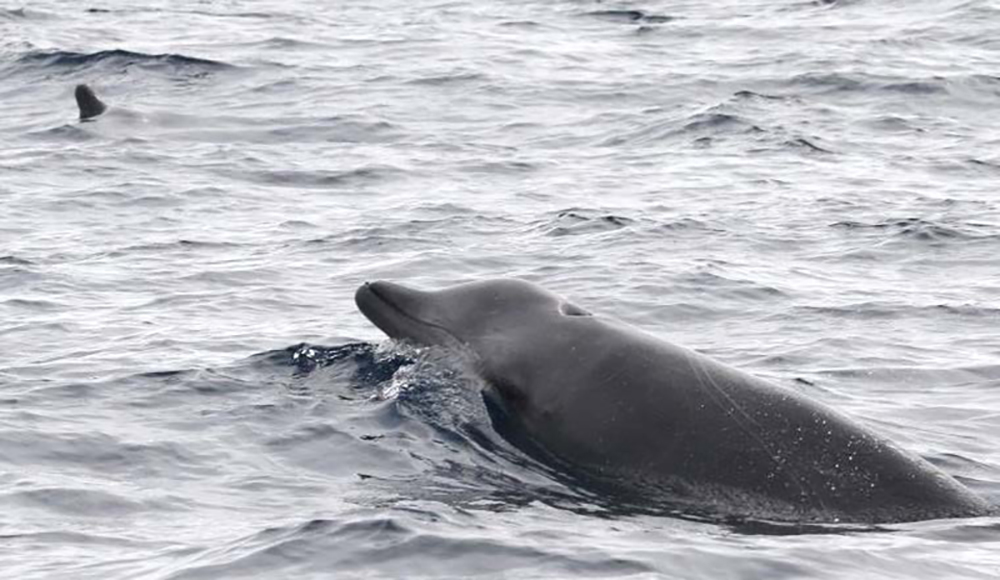Save Marine Mammals! End Plastic Use and Compost
For immediate release ‐ July 13, 2019
Contact: Jessica Wackes, 919.707.9850. Images available upon request
By Devyn Barron, NCMNS Summer Intern
Have you ever wondered what the waste in the garbage bin may look like 30 years from now? You may expect something like a pile of dirt or broken down bits, but more than likely it will look exactly like what is was when it was thrown out.
Since a landfill is sealed once it’s completed, the anaerobic (without oxygen) environment tremendously slows down the decomposition of all waste. Landfills unfortunately act like a smelly kind of time capsule for us to look back through.
Pollution and plastic waste
Landfills today have many regulations to ensure waste is secured and not polluting the environment, but there is only so much protection they can have against wind or storms. Waste from landfills is often carried away from the site and into the natural world, especially plastics because of their light weight.
Plastics are easily blown off garbage trucks and from the landfills themselves. Most of these plastics end up in our streams, rivers and lakes where they will eventually travel down the watershed and into our oceans.
It may not seem like that plastic bag from the grocery store or the straw in your drink going into the trash may cause such a problem, but it could cost the life of a True’s beaked whale and many other marine species.
 True’s beaked whales are large, social creatures.
True’s beaked whales are large, social creatures.
True’s beaked whale
True’s beaked whales are an incredible species that can grow up to 17 feet long and weigh around 2,200-3,000lbs! These magnificent migrators travel thousands of miles every year in the Atlantic Ocean. One of their means of navigation is through the use of sound. Calling to mates and using echolocation to measure distance, these large mammals rove the deep, warm waters of the Atlantic Ocean.
On their deep dives below the ocean’s surface, they eat many small fish and squid by taking in open mouths of water. In an ocean that is quickly becoming a plastic dump zone, True’s beaked whales are in danger of ingesting plastic waste because it is difficult for them to identify what is edible and what is not.
Tragically, True’s beaked whales have been found with plastic bags in their intestines that prevented them from getting real food to their bodies and causing them to starve. Their way of life and their natural instincts, which have evolved over thousands of years, are now failing them.
Other washed up True’s beaks have been found with small plastic pieces in their stomachs. When whales ingest plastics, not all cases will immediately cause starvation, but it creates this false sense of fullness, while also leaching plastics into their bodies that are likely carcinogenic or harming to their overall wellness. Over time, this creates problems that surpass the individual whale, but entire families of whales. Although these whales are often found traveling alone, there is still a very social aspect to these mammals and can be found traveling in groups of up to six at once.
These beautiful, intelligent whales don’t deserve a toxic environment! Every species on this planet generates waste that is naturally recycled through earth’s systems except for us humans. Rather than buying plastics and generating waste we desperately need to reduce plastic waste and compost! A plastic-free life is not impossible. In fact, as a society we didn’t use plastics for nearly all packaging until the 50s, which was not that long ago.
 A True’s beaked whale specimen on display at NCMNS.
A True’s beaked whale specimen on display at NCMNS.
What can you do?
When going to the grocery store, try buying things in bulk and weighing it in your own containers. Bring reusable food containers if know you are going out to eat, and your own water bottle/mug to fill drinks if you are on the go! Another easy solution is to keep reusable grocery totes in your car for grocery trips.
Starting your own compost and aiming for only using compostable products can help recycle nutrients back to the land, not the ocean. There are dozens of other easy solutions to going plastic free, and it literally means saving the lives of our beloved marine species.
For more information about our upcoming activities, conservation news and ground-breaking research, follow @NaturalSciences on Instagram, Twitter and Facebook. Join the conversation with #visitNCMNS.

